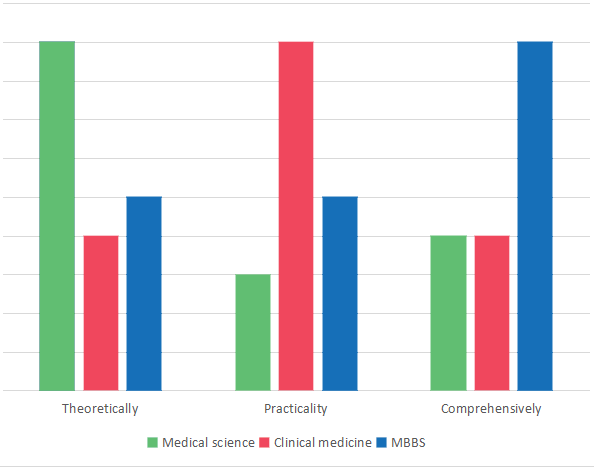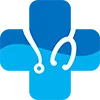- Newsletter
Clinical Medicine
What is Clinical Medicine?
Medical science and practice based on direct observation of patients.
Clinical medicine is a form of science that places a greater emphasis on practice. It focuses on directly healing patients through diagnosis, treatment, surgery, prognosis, etc.
Basic medicine, on the other hand, focuses on researching the laws of human life and disease phenomena in order to provide the necessary theoretical support for clinical practice as part of the efforts to cure patients.
Clinical medicine is an art in that you must understand the process rather than memorize drug names by heart. To study clinical medicine, you must first ensure that you have a thorough understanding of basic medical science.
Clinical medicine, on the other hand, is one of the most important aspects if you’re a student of medicine, nursing, or any other health-related course that involves human lives. Because you need to know why a patient is actually showing certain clinical signs and symptoms, as well as why you’re performing certain investigations and interventions.
Clinical medicine is the common form of medicine, which represents the responsibilities of the general clinician towards patients. Briefly, clinical medicine is the study and practice of medicine based on direct observation of patients. Understanding a patient’s problems by a proper clinical history, examinations and investigations and the methods of treatments are very important to diagnose the disease. Therefore clinical medicine has an important role in diagnosing disease and treating the patient.
Unlike other science fields that focus more on the theoretical and basics of medical science, in clinical medicine, medical practitioners assess patients in order to diagnose the disease, cure the patient, and prevent disease. Medical practitioners conduct a medical interview about a patient, called clinical history which includes the following:
- Chief complaint/Presenting complaint to identify the problem
- History of presenting complaint that explains the chief complaint. Here, Signs, symptoms, other associated problems, how they change over time, and all other clinical features of the patient are assessed in detail.
- Inquiry of other systems such as recent and abrupt changes in weight, fevers, sleep, etc.
- Past medical & surgical history, will be useful in the diagnosis and management of the patient.
- Family & Social history to see familial diseases, the habit of drinking alcohol, etc.
- Drug history to see ongoing medications and adverse effects due to drugs
- Allergies for foods, drugs, plasters, etc.
Physical examination is carried out using common medical devices such as stethoscope, tongue depressor, thermometer, etc. to diagnose the disease and some relevant medical investigations may also be conducted, e.g. blood tests, biopsy, etc. to come a diagnosis.
By using the clinical history from the patient, clinical examination findings and the data from investigation reports from laboratories, physician makes the diagnosis and prescribes medications (e.g. pharmacological drug treatments) accordingly.
How to study Clinical Medicine?
Clinical Medicine is one of the most challenging, yet extremely interesting, subjects in clinical training. Your clinical medicine knowledge will benefit you throughout your career, and it may even save someone’s life one day.
We’ve outlined all of the most effective methods for studying clinical medicine so you can cut your study time in half, retain more information, and perform well on your exams and as a doctor.
1) Create a positive environment for learning.
You can maximize your learning efficiency by creating a good learning environment. A productive outcome will result from a combination of effective time management, good reading and note-taking skills, illustration skills, developing effective test-taking strategies, and hard work. Identify all of the distractions in your environment that are interfering with your concentration. That is the key to achieving success.
2) Have a basic knowledge of clinical science.
Remember! Anatomy, Physiology, and Pathology aren’t just useful for exams; they’re also useful in everyday life. You don’t have to be a genius in Anatomy and Physiology, but you should know the basics to understand Clinical Medicine and what happens inside the body in diseases. So, if you’re going to study Myocardial Infarction clinical medicine this week, just brush up on your basic Anatomy, Physiology, and Pathology of Myocardial Infarction. So, when your professor discusses Myocardial Infarction in a lecture, you’ll easily understand how a blood clot blocks Coronary Arteries and causes complications in the specific area of the heart supplied by the artery.
3) Know the teaching style of your professor!
Every professor has a distinct teaching style. Some professors may provide you with study notes prior to lectures so that you can get a general idea of what to expect. Some professors expect students to learn independently from textbooks and research. You can ask your seniors how they studied the subject if you have such professors.
Some professors give you homework and assignments based on the theories that are mainly assessed in the exams. So you should focus more on such topics and related questions.
4) Collect resources to study
There are numerous resources available to assist you in your academic endeavors. To maximize your studying effectiveness and reinforce the concepts in Clinical Medicine, you should use all of the resources and a combination of learning techniques. You can use your textbooks, class handouts, reading materials, and lab materials provided by your professor, as well as many online resources available to students.
- Textbooks: For your studies, always use standard textbooks. They provide you the extremely reliable resources. Because you can clear up any unanswered doubts or brush up on a chapter you’re unfamiliar with.
- Reading materials: You should always study your university’s reading materials and notes. Because they will give you chapter-by-chapter notes on what you need to know for your exams.
- Google: For any topic, Google is always our best friend. To make learning easier, you can look up mnemonics, diagrams, and word associations. However, always make sure you’re referring to reliable sources. Because not everything you find on the internet is 100% accurate. For high-quality and reliable articles, I always use and recommend websites like Medscape, PubMed, and MayoClinic.
- YouTube: There are plenty of YouTubers who make learning fun. On YouTube, many complex topics in clinical medicine are explained in an understandable manner. This is particularly beneficial for students who are visual or auditory learners.
You can gain access to our Medical Resources Library, which contains over 300 medical presentations and other medical resources that will benefit you throughout your career.
5) Understand the theories rather than memorize them.
You can’t memorize facts if you don’t understand them first. You can create a flowchart with all of the mechanisms and a study sheet for each disease. If you try to memorize the facts, you will quickly forget them. So you have to understand the pathophysiological process that happens in disease.
6) Take Good Notes
You will not remember everything you hear, but taking notes will assist you in remembering more. You may not understand everything your professor says in class at times. However, when you return home and review your notes, you will have a better understanding of them. These notes will be extremely beneficial in understanding the theories explained in books and in your institute’s reading materials.
These notes are also the key to getting high grades on your exams. Before your exams, you can concentrate more on these notes, and they will help you answer MCQs based on theories not covered in your reading materials.
Professors may also tell you about memorizing techniques they’ve used in the past, which will help you revise the subject more effectively if you write them down. Clinical Medicine is a challenging but interesting art in your medical career. Taking good notes on your own, on the other hand, will help you do well in exams and in your clinical practice.
7) Make a good set of Flashcards
Clinical medicine is one of the most detailed and important topics in medical, dental, and nursing programs. You can make different flashcards in the form of questions and answers or diseases and their related clinical findings etc. Before the exams, you can use flashcards in the form of questions and answers.
Make flashcards out of the chapters that are most important to you and the topics that you tend to forget. As a result, revising will be much easier than reading the textbooks again and again.
Additionally, flashcards have a visual impact on your brain that aids in information retention. Small theories like “lung cancer complications” or “pathophysiology of Myocardial Infarction” can serve as excellent flashcards for last-minute preparations. To back up your theory, draw an occluded vessel with a thrombus to illustrate myocardial infarction, and that image will stay in your mind for years.
I used to make beautiful flashcards to explain the pathophysiology and clinical presentation of each disease during my studies. I’ve created it as a high-resolution PDF eBook that you can download and print yourself.
8) Make your Study Sheets
Creating study sheets for each exam, similar to flashcards, can be extremely beneficial. You can make a note on one page that covers every important point of that chapter using other resources such as lecture notes, textbooks, and flashcards. As a result, you will be able to revise the notes in a short period of time before the exams.
For example, if you’re creating a study sheet on Ischemic Heart Disease, you can include more sub-sections such as Stable Angina, Unstable Angina, Non-ST Elevation Myocardial Infarction (NSTEMI), and ST-Elevation Myocardial Infarction (STEMI), as well as pathophysiology for each on a single page. So you can compare and understand the progression of the disease.
9) Create Mnemonics
Mnemonics have been extremely useful in my medical career and as memory aids for me. In Clinical Medicine, you must remember diseases that are very similar, so mnemonics will aid in remembering the differences. If you do a google search on the topic you’re working on, you’ll find tons of mnemonics. Mnemonics can help you remember a lot of information in a short amount of time, and you can use them for any subject in medicine, from Anatomy to Surgery.
You can make your own mnemonics and write them down to help you remember the chapter more quickly and easily. I used a lot of mnemonics during my medical school years. You can get them as an eBook.
10) Recall facts by using word associations.
When studying Clinical Medicine, you’ll come across a lot of unusual and difficult words that can be difficult to remember. The use of word associations will greatly assist you in this process.
For example, the words Thrombus and Embolus can be linked as,
- Thrombus is Tight – Thrombus is anchored to a specific location.
- Embolus Escapes – Embolus dislodges and travels to a faraway location.
I absolutely love these simple methods for studying any subject, such as mnemonics and word associations. My friends tease me for inventing clever mnemonics to help me remember difficult concepts, particularly in pharmacology. But we never forgot them even after the exams. They’re effective ways to remember any chapter for a long time.
11) Learn what type of learner you are
Decide which learning style is best for you. This is true not only for Clinical Medicine but for any medical or nursing school subject. Do you find that mnemonics and flashcards help you remember things? Are you a verbal learner? Because most students have a mix of learning styles, you’ll need to figure out which one is best for you in order to be more effective. Then, in your own unique way, maximize your study efforts in order to achieve a high score. If rewriting notes doesn’t work, don’t bother with them. If using flash cards helps you remember, go ahead and use them!
12) Record the Lectures
This is something I recommend for every lecture so you can catch up on anything you may have missed during the lecture. If you’re allowed to record the lecture, this is a viable option. Recording your lectures will assist you in revising them. You can listen to them in your spare time to learn more. This will undoubtedly aid in the process of memorization of the key theories discussed in the lectures.
However, don’t put too much pressure on recording and listening to it again. Listen to the lecture and try to jot down some notes during it. Because if you try to make a note after coming to the home, you’re spending your time twice. Because in medical school, time management is crucial.
13) Study actively
Clinical medicine is not like reading a book. Active learning techniques are critical, especially when learning about the physiological and pathological processes that occur inside the human body.
When you’re studying a difficult subject like Clinical Medicine, it takes up a lot of your time. So you have to listen to your professor lecturing, use reading materials, books, flowcharts, short notes etc.
14) Work in groups
Sometimes in complicated subjects like Clinical Medicine, you don’t always understand the facts the first time you hear them. Working in groups can thus be beneficial to some students. Having your friends explain complex physiological or pathophysiological processes to you, quiz you, or discuss past papers can sometimes help you retain more and more information. Having a study group of friends, on the other hand, will keep you motivated to study. Peer teaching has been shown to be very effective in helping students retain more information in studies.
15) Repetition
You’re more likely to forget many complex mechanisms the more you learn. So, in order to keep everything you’ve learned fresh in your mind, you should practice what you’ve learned over and over. You can review your notes on a daily, weekly, or monthly basis, but repetition is necessary to improve your memory.
16) Quiz yourself
Test your knowledge again and again. You can create your own questions and quiz each other with your friends, or you can use past papers or model papers provided by your university or lecturers. This is a must-do activity if you want to get good grades because you’ll know exactly what you need to study.
17) Review your mistakes
Truth is, when you do self-review and when you make a mistake, if you correct it by your reference materials then you’re very unlikely to forget it. As a result, always pay close attention to where you went wrong.
Journal of Clinical Medicine
Journal of Clinical Medicine is an international peer-reviewed open access journal published monthly online by MDPI, an organizational acronym used by two related organizations, Molecular Diversity Preservation International and Multidisciplinary Digital Publishing Institute, which were both co-founded by Shu-Kun Lin. – According to Wikipedia.
Differences Between Clinical Medicine, Basic Medicine and MBBS
Clinical medicine is the study and practice of medicine based on direct observation of patients which focuses on diagnosis and management of the patient.
Basic medicine focuses on studying the basic structural and functional theories of the human and diseases which gives the fundamental support for the clinical medicine.
MBBS full form is Bachelor of Medicine, Bachelor of Surgery is more comprehensive. MBBS is a degree that combines both theoretical and practical medical knowledge. In conclusion, MBBS is a combination of clinical medicine and basic medicine.
We can compare the differences among them by,

Clinical Medicine Review (CMR)
The Clinical Medicine Review provides a platform for communication and the sharing of knowledge for academics, researchers, and practitioners in the field of clinical medicine. CMR intends to offer timely and sustainable publication of research articles, review articles, case reports, and editorials.

- Library





